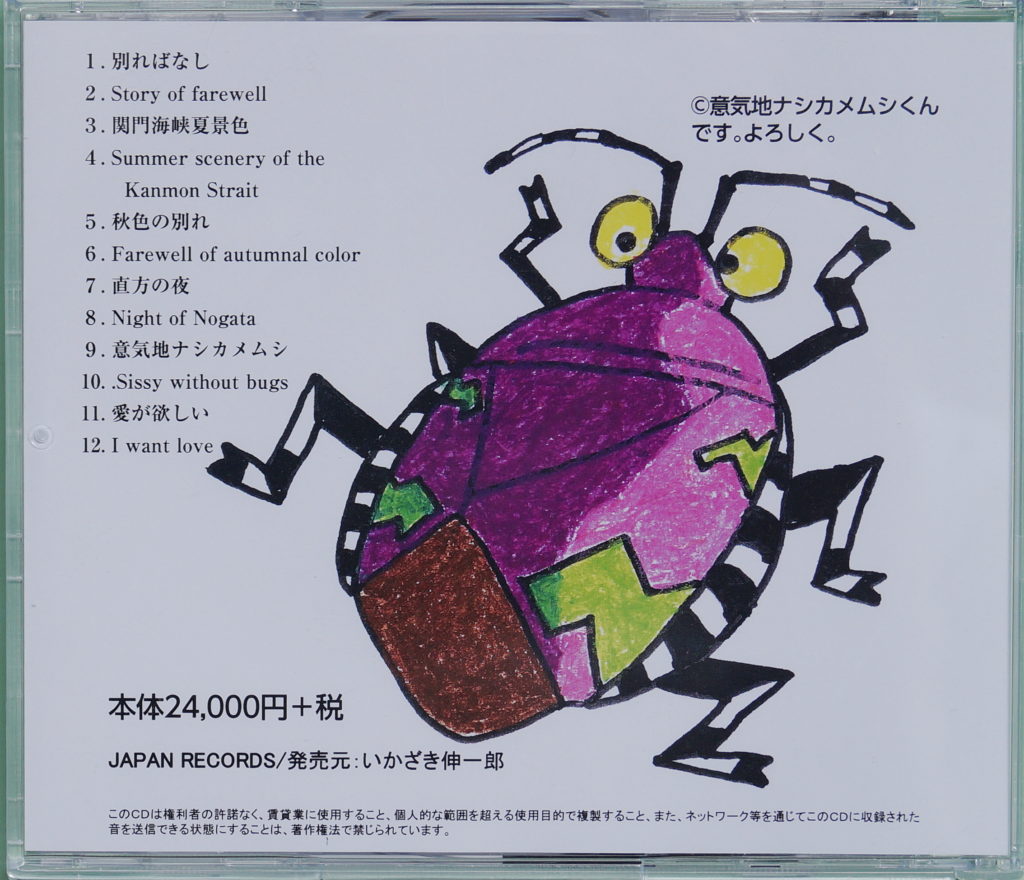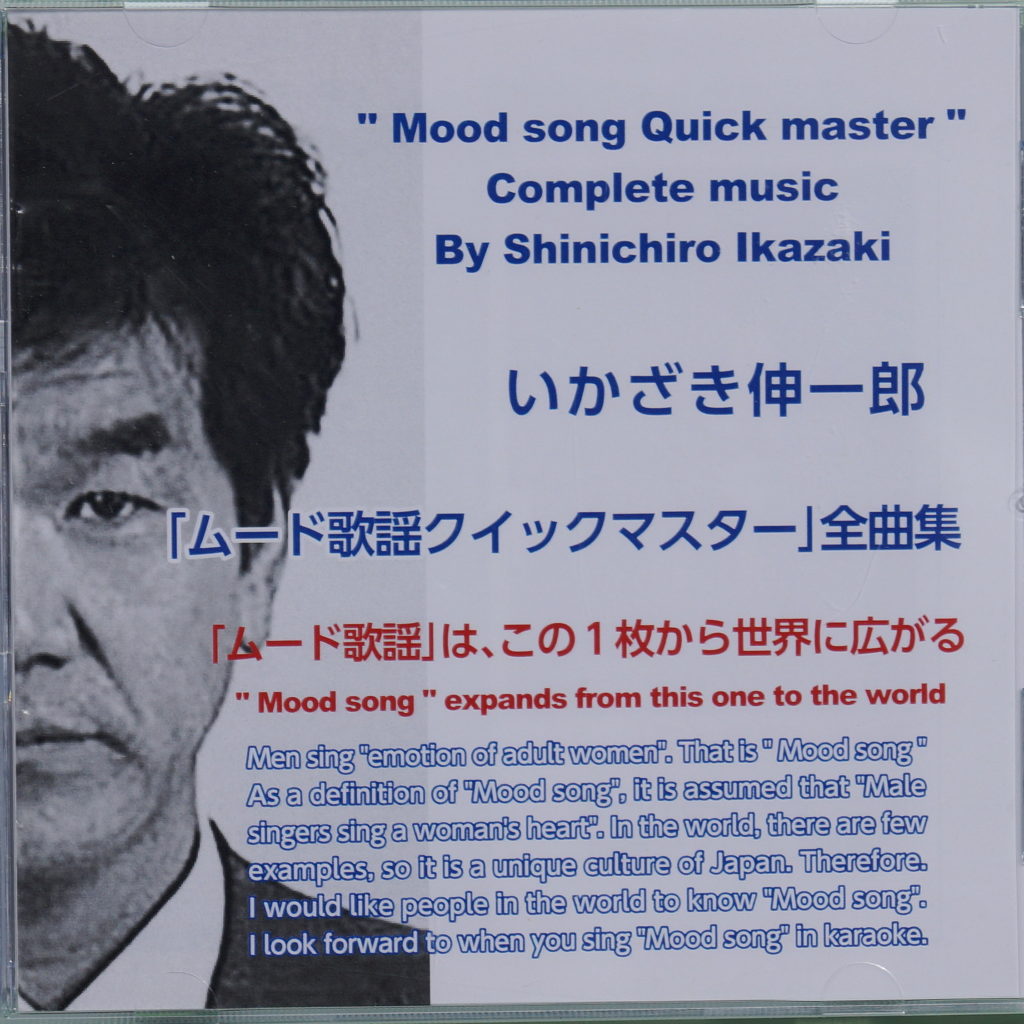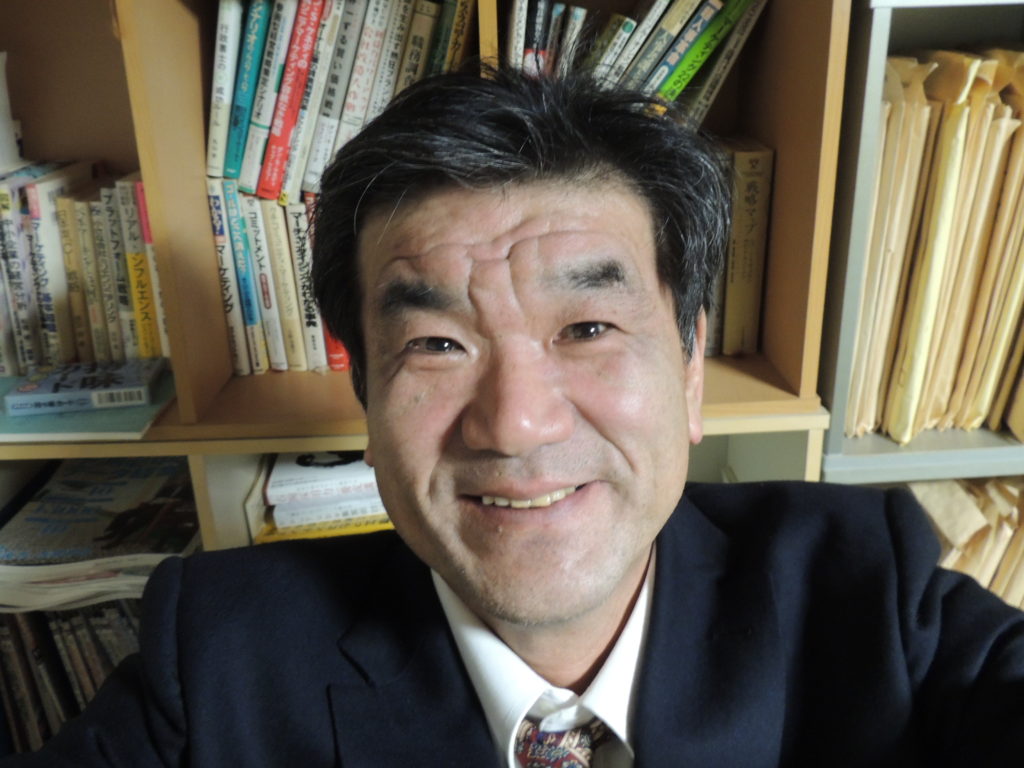
Singing with a concert 
Taking insects! 
Of course! Talk too. 
I’m working?
●ごきげんいかがですか?歌手のいかざき伸一郎です。
ムード歌謡を歌ってます。
では、さっそく聴いてください。「意気地ナシカメムシ」
●1番、(歌)「意気地ナシカメムシ」5分
●(MC)5分
(前に、付箋台を置き、スケッチブックを載せる)
(スケッチブック1枚目:「60歳から覚えてね!英単語コーナー」の文字見せながら)
ありがとうございました。(深く礼をする)
じつは私、今。英単語を覚えています。
ただ。年を取ったらダメですね。覚えることはできるのですが。その後は残念!
リアルに表現すれば、ザルで水をすくうようなもの。
せっかく覚えた英単語が、頭からザーザーとこぼれ落ちてしまいます。
Thank you very much
Actually, I am studying English words now.
However, it is not good if you get older. I can remember, but sorry afterwards!
After that, it will be disappointing.
If you express it realistically. Kind of like drawing water in a colander.
The English words that I have learned are spilled out of my head.
むかし。年表や英単語を覚えるための文書がありましたよね。
そして。一度覚えたら、忘れませんでしたよね。
そうです。そんな文書を、英単語ごとにつくればいいんです。
Old days. There were documents for memorizing chronological tables and English words.
And. Once you remember, you did not forget.
That’s right. Just create such a document for each English word.
そして。TOEICテストによく出る英単語が、手軽に覚えられるよう!
作詞家でもある私、いかざき伸一郎は、心に残るよう、英単語を作詞しました。
そして。その文書を、みなさんに紹介します。
「60歳から覚えてね!英単語」コーナー。を、開催します。お楽しみに~。
And. English words frequently used in the TOEIC test can be easily remembered!
Shinichiro Ikazaki, who is also a lyricist, wrote English words in a memorable way.
And. I will introduce that document to everyone.
The “ Japanese language course from 60 years old ” corner will be held.
Let’s looking forward to it!
では、さっそく、はじめます。
今回のテーマは、蒸し無視むし。
(スケッチブック2枚目:「蒸し無視むしで覚える英単語」の文字見せながら)
今回は。蒸し無視むし。です。
9月も中旬。さわやかな風吹く秋ですね。でなく。まだまだ暑いざんしょ。残暑。
まだまだ。空気は。蒸し蒸し。蒸し蒸し?無視無視??そう!むし虫。
意気地なし カメムシ♪ 私、伸一郎の「意気地ナシカメムシ」。よろしくお願いします。よかったですね・・・またもや。「梨の妖精」ふなっしー。
おいおい!またもや。りんご娘のミニスカートじゃね~んかよ。ジャンジャン。
おいおい!秋と言えば。もちろん!食欲の秋。だろ~。梨やブドウ、モモ、リンゴなどなど。
おいしい!くだものが。テーマじぇねんかよ。なんで!「虫」なんだ。関係ね~だろ。
そんなもん。オレは。無視無視!無視虫。もんじゃ。
そう言わず。いいですか。虫を数字にすると。「64」。
8×8(ハッパ)、64(ロクジュウヨン)で。末広がりのパチパチもんですよ。
それ。8がツーで。8月だろ~。9月と関係ね~だろ。
それはそうなんですが・・・。8月終わったし。それと。虫好きは。9月の中ごろになると。「虫の季節も。今年は終わりだな。また来年」と。心は。「よろしく哀愁♪」なんです。
だから。蒸し蒸し。無視無視は。もう。むし虫。なんです。他に考えられません。
そうか~。わかった。5月のテーマ。変更させたし。今回は。オレを無視し。虫にし。
ということで。蒸し蒸し。無視無視は。もう。むし虫。気分で。英単語を覚えましょう!
では。まずは、こちら。
So, let’s get started.
The theme this time is. Let’s learn Japanese with Steamed, Ignore, Insect.
September is also in the middle. Autumn with a refreshing breeze.
But it’s still hot. Lingering summer heat.
The air is still steamy. Steamed Steamed? Ignore Ignore? ? yes! Insect Insect.
Ikujinashi kamemushi♪
This song’s title is ” Sissy without bugs ” I am singing. Thank you.
It was good! ・・”Pear Fairy” Funassyi again.
Hey you! Wait a minute. Isn’t it good that the apple girl’s miniskirt again?
Jean Jean.
Hey you! Speaking of autumn. of course! It’s the autumn of appetite. Pears, grapes, peaches, apples, etc. Delicious! fruit. that’s a theme isn’t it.
why! “insect”. It does matter. That’s . Ignore, ignore! Ignore Insect. Monja.
Don’t say that. May I. If you put insects into numbers. “64”.
8 x 8 (Happa), 64 (Rokujuyon). It’s also a crackle that spreads at the end.
That is. 8 is two. It’s August. It has not something to do with September.
That’s right, but… August was over. And. Insect lovers will become around mid-September. “This year is the end of the insect season. See you next year.”
My mood is “Yoroshiku sorrow♪”.
That’s why. Speaking of steamed. And speaking ofignoring. Ofcourse! Insect. I can’t think of anything else.
I see. all right. You changed the theme for May at my request.
So ignore me this time. Be an insect.
Speaking of steamed. And speaking ofignoring. Ofcourse! Insect.
Let’s learn Japanese words by this feeling!
OK. First, here.
(スケッチブック3枚目:「下記の単語を書いた」の文字見せながら)
Rarely
めったにない
レアリー。めったにない。という意味ですね。
はい。では。なぞかけのノリでいきますね。
レアリー。とかけて。めったにない。と解く。その心は。
Rarely. Mettaninai. That means.
Yes. OK. I do it in a next way.
Rarely. Tokakete. Mettaninai. Totoku. Sonokokorowa.
(スケッチブック4枚目:「下記の言葉を書いた」の文字見せながら)
めったにいない、まれアリ
あり~。「アリ」の希少種って。なんでしょう?すみません。私は知りません。
はい。続いて。
Mettaniinai, mareari.
That? What is the rare species of “ant”? excuse me. I do not know.
Yes. continue.
(スケッチブック5枚目:「下記の単語を書いた」の文字見せながら)
A out of (every) B
BのうちA
アウトオブエブリ。BのうちA。という意味ですね。
アウトオブエブリ。とかけて。BのうちA。と解く。その心は。
A out of (every) B.That means. BnochiA.
A out of (every) B. Tokakete. BnochiA. Totoku. Sonokokorowa.
(スケッチブック6枚目:「下記の言葉を書いた」の文字見せながら)
アブ飛ぶエブリ。オレのうち、毎日アブ飛ぶ
ウシアブ?シオヤアブ?とにかくウルさい!ですね。
では、つぎ
Abu tobu eburi. orenochi, mainichi abu tobu.
Usiabu? Shioyaab? Anyway, it’s noisy! is not it.
Yes. Next.
(スケッチブック7枚目:「下記の単語を書いた」の文字見せながら)
Ban
禁止する
バン。禁止する。という意味ですね。
バン。とかけて。禁止する。と解く。その心は。
Ban. Kinshisuru. That means.
Ban. Tokakete. Kinshisuru. Totoku. Sonokokorowa.
(スケッチブック8枚目:「下記の言葉を書いた」の文字見せながら)
伴さんのトンボ採りを禁止する
「山口むしの会」の。トンボ担当者です。禁止は。つらいですね。
はい。つぎ。
Bansanno tombotoriwo kinshisuru.
He is the dragonfly manager of the Yamaguchi Mushino Kai. Banning is hard.
Yes. OK.
(スケッチブック9枚目:「下記の単語を書いた」の文字見せながら)
Extinction
絶滅
イクステンクション。絶滅。という意味です。
イクステンクション。とかけて。絶滅。と解く。その心は。
Extinction. Zetsumetsu. That means.
Extinction. Tokakete. Zetsumetsu. Totoku. Sonokokorowa.
(スケッチブック10枚目:「下記の言葉を書いた」の文字見せながら)
残りの数匹も、行くす天、くしょん。絶滅です
生物は。1日に約100種。絶滅しているようです。
はい。では。
Nokorino suhikimo, ikusu ten, kushon. zetsumetsudesu.
It seems that about 100 species of organisms go extinct every day.
Yes. OK.
(スケッチブック11枚目:「下記の単語を書いた」の文字見せながら)
Insect
昆虫
インサクト。昆虫。という意味です。
では。インサクト。とかけて。昆虫。と解く。その心は。
OK. Insect. Tokakete. Konchu. Totoku. Sonokokorowa.
(スケッチブック12枚目:「下記の言葉を書いた」の文字見せながら)
昆虫を揚げると、イン、サクッと、うまい!
実際。ウマい!みたいです。近い将来。毎日食べるでしょうね。
はい。では、つぎ。
Konchuwo ageruto, in, sakutto, umai!.
Really delicious! it seems like. Near future. We would eat it every day.
Yes. Then, next.
(スケッチブック13枚目:「下記の単語を書いた」の文字見せながら)
Insecticides
殺虫剤
インセクティサイドゥ。殺虫剤。という意味です。
インセクティサイドゥ。とかけて。殺虫剤。と解く。その心は。
Insecticides. Satchuzai. That means.
Insecticides. Tokakete. Satchuzai. Totoku. Sonokokorowa.
(スケッチブック14枚目:「下記の言葉を書いた」の文字見せながら)
インセクって、クサイど。だから、殺虫剤で殺す
インセクって、インサクト。昆虫のことです。
はい。では。
Insekutte, kusaido. dakara, satchuzaide korosu.
「Inseku」is「Insakuto」. I mean insects.
Yes. OK.
(スケッチブック15枚目:「下記の単語を書いた」の文字見せながら)
Merely
ただ単に、単なる
メアリー。ただ単に、単なる。という意味です。
メアリー。とかけて。ただ単に。と解く。その心は。
Merely. Tadatanni, Tannaru. That means.
Merely. Tokakete. Tadatanni. Totoku. Sonokokorowa.
(スケッチブック16枚目:「下記の言葉を書いた」の文字見せながら)
アミメアリ~だ!珍しいの?ただ単に好きなだけ
頭やからだに。網目があるアリですね。
はい。では、こちら。
Amimeari~da!mezurashiino?tadatanni sukinadake.
An ant with a mesh on its head and body.
Yes. Then here.
(スケッチブック17枚目:「下記の単語を書いた」の文字見せながら)
Ridiculous
ばかげた、非常識な
リディキュラス。意味は。ばかげた、非常識な。
リディキュラス。とかけて。非常識な。と解く。その心は。
Ridiculous. Meaning.Bakageta, Hijoshikina.
Ridiculous. Tokakete. Hijoshikina. Totoku. Sonokokorowa.
(スケッチブック18枚目:「下記の言葉を書いた」の文字見せながら)
アリでキューらす。非常識な、ありがとう、サンキュー
ぜんぜん。ありがたみがないですね。
はい。では、こちらの。
Aridekyurasu. hijoshikina, arigato, sankyu.
There is absolutely no gratitude.
Yes. Then here.
(スケッチブック19枚目:「下記の単語を書いた」の文字見せながら)
See if
・・かどうか確かめる
シーイフ。・・かどうか確かめる。という意味です。
シーイフ。とかけて。・・かどうか確かめる。と解く。その心は。
See if. ・・kadoka tashikameru. That means.
See if. Tokakete. ・・kadoka tashikameru. Totoku. Sonokokorowa.
(スケッチブック20枚目:「下記の言葉を書いた」の文字見せながら)
マテバシイ増える、あのチョウはムラサキツバメかどうか確かめる
マテバシイは。ムラサキツバメの。食樹です。
Matebashii fueru, anochoha murasakitsubamekadoka tashikameru.
Matebashii is the food tree of the murasakitsubame.
Then the last.
(スケッチブック21枚目:「下記の単語を書いた」の文字見せながら)
Labs
研究所
ラブス。研究所。という意味です。
ラブス。とかけて。研究所。と解く。その心は。
Labs.Kenkyusho. That means.
Labs. Tokakete. Kenkyusho. Totoku. Sonokokorowa.
(スケッチブック22枚目:「下記の言葉を書いた」の文字見せながら)
虫ラブす。昆虫研究所
でないと。昆虫の研究は。できません。
はい。では。最後に。一句。
Mushi rabusu. konchu kenkyusho.
If you don’t like it, you can’t study insects.
Yes. OK. Finally. A phrase.
(スケッチブック23枚目:「下記の句」の文字見せながら)
英単語 セクシーに脱皮 セミヌード
アブラゼミの。幼虫から羽化したばかりの成虫は。神秘的です。
からだはミドリ。はねは白。脈のうす青色が。美しいですね。
油で揚げたら。アブラゼミ?インサクっと!なんちゃって~。ジャンジャン!
これで。あなたの頭と心に。しっかりと残りました。
と、いうことで。
Adults that have just emerged from the larvae of Abra cicada are mysterious.
The body is green. Wings are white. The pale blue color of the veins is beautiful. After frying in oil. Abra seminar? Insakutto! What the hell Jean Jean!
Yes, with this. On your head and heart. It remained firmly.
Yes. OK.
(スケッチブック24枚目:「下記の句」の文字見せながら)
「60歳から覚えてね!英単語コーナー」でした。
次回も。お楽しみに!ジャンジャン!
ありがとうございました。(深く礼をする)
では、聴いてください。「関門海峡夏景色」
” Let’s learn Japanese from 60! No.61 ” is over.
Next time. Let’s looking forward to it! Jean Jean!
Thank you very much (I bow deeply)
Then, please listen. ” Summer scenery of the Kanmon Strait “
●2番、(歌)「関門海峡夏景色」5分
●ありがとうございました。(深く礼をする)
